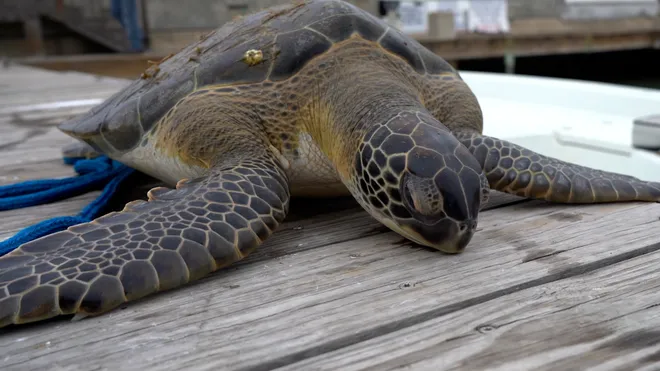Rescuers race against the clock as sea turtles recover after freezing temperatures
Biologists raced to save sea turtles off the North Carolina coastline after chilly ocean waters put the turtles at risk of freezing to death.
"These are turtles that are suffering from cold-stunning, which is a form of severe hypothermia that causes their whole bodies to shut down and basically causes severe hypothermic shock," said Kathy Zagzebski, the executive director of the Karen Beasley Sea Turtle Rescue and Rehabilitation Center on Topsail Island, a 26-mile island off the state's coast. "If people don't intervene, then the endangered turtles won't make it."
The center was bustling with activity on Friday as rescuers attended to the 93 turtles taken in since January, including 35 that arrived on Tuesday.
Many of the turtles rescued by other organizations did not survive. The North Carolina State University Center for Marine Sciences and Technology took in 109 sea turtles, but only 36 survived. At the North Carolina Aquarium, 24 turtles died, aquarium spokesperson Christian Legner said.
At Zagzebski's organization, two turtles did not make it.
"It's been a really crazy week," Zagzebski said.
Most of the turtles taken in by the Center were rescued from Cape Lookout, a seashore stretching 55 miles over the North Carolina shoreline. Park biologists at the Cape Hatteras National Seashore, which spans over 70 miles from Bodie Island to Ocracoke Island, reported in a Facebook post that more than 100 cold-stunned sea turtles were also discovered along the shoreline in just five days since last Thursday.
Although some turtles are cold-stunned as frigid weather chills the oceans every winter, this year has hit them particularly hard. The influx of so many turtles in need of help came after temperatures in the state dropped abnormally low, well below freezing, impeding the turtles' natural migratory patterns.
"That's enough to lower the water temperature enough so that any turtles that have not migrated to warmer water are going to be caught in this hypothermia," said Zagzebski.
Considering that a turtle's preferred water temperature is 70 degrees or warmer, Zagzebski said, any turtles that lost the chance to follow their natural migratory patterns towards the Gulf Stream were in dire straits.

More:How long do turtles live? Here are the expected lifespans for pet, wild tortoises.
Rescuers gradually warm turtles, administer medicine
Turtles in treatment at the Karen Beasley Sea Turtle Rescue and Rehabilitation Center are warmed up over a period of several days and given fluids and medicine to nurse them back to health.
"Some of these turtles were colder than 40 degrees Fahrenheit as their body temperature when they came in, so we're warming them gradually," said Zagzebski.
As the turtles warm up, rescuers give them a daily swim test to check how they would fare on their own. "Some of them just really are failing multiple times," Zagzebski said. "They're really just not strong enough to swim yet."
Rescuers also administer antibiotic eye drops to turtles who sustained eye injuries while they were tossed in the surf.
"Some of them have more severe injuries," said Zagzebski. "Actually, a couple have some old injuries that look like propeller wounds."
In those cases, rescuers rinse out the wounds with sterile saline and give the turtles antibiotics.
Zagzebski said turtles can spend over a year in rehabilitation, depending on the severity of their condition. "There are some turtles that we should be able to release within a month or two," she added.
Zagzebski stressed that beachgoers who come upon a beached turtle should never throw it back into the ocean. "These turtles are cold," she said. "They do need medical intervention by people trying to help them."
In North Carolina, anyone can report a stranded turtle via a 24/7 hotline run by the North Carolina Wildlife Resources Commission: 252-241-7367.
Contributing: Associated Press
Cybele Mayes-Osterman is a breaking news reporter for USA Today. Reach her on email at cmayesosterman@usatoday.com. Follow her on X @CybeleMO.
Disclaimer: The copyright of this article belongs to the original author. Reposting this article is solely for the purpose of information dissemination and does not constitute any investment advice. If there is any infringement, please contact us immediately. We will make corrections or deletions as necessary. Thank you.






